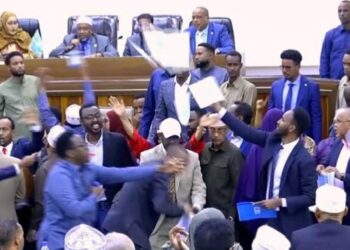A U.S. federal judge in Boston has issued an emergency order blocking the Trump administration’s controversial plan to deport migrants to Libya, declaring the proposed removals would “blatantly violate” a previous court order protecting immigrants’ due process rights.
The late Wednesday ruling came just hours after reports emerged that U.S. authorities were preparing to fly migrants to the conflict-ridden North African nation as early as this week.
The legal showdown began when immigration lawyers filed an urgent motion revealing that deportation flights to Libya were being readied.
In his order, U.S. District Judge Brian Murphy cited his earlier injunction requiring officials to provide migrants facing deportation with proper written notice in their native language and a meaningful opportunity to challenge their removal.
The judge’s intervention represents a significant setback for the administration’s aggressive immigration enforcement agenda.
The proposed deportations drew immediate condemnation from Libya’s internationally recognised government. Prime Minister Abdul Hamid Dbeibeh took to social media to declare his country’s refusal “to be a destination for the deportation of migrants under any pretext.”
The strong rejection creates a diplomatic complication for U.S. plans, as Libya remains fractured between rival governments in east and west following the 2011 overthrow of Muammar Gaddafi.
Security analysts and human rights groups warn that deporting migrants to Libya could expose them to grave dangers. The U.S. State Department currently advises Americans against travel to Libya due to rampant crime, terrorism, civil unrest and arbitrary detention.
United Nations reports have documented horrific conditions in Libyan detention centres, including torture, sexual violence and forced labour.
When questioned about the deportation plan on Wednesday, President Donald Trump claimed no knowledge of the specifics. “I don’t know. You’ll have to ask Homeland Security,” he told reporters.
The administration has been actively seeking third countries to accept deportees as part of its immigration crackdown, with Rwanda recently confirming preliminary talks about potentially taking in migrants removed from the U.S.
The Libya controversy comes as the Trump administration expands its deportation machinery through unconventional means. Earlier this week, immigration authorities began offering $1,000 payments to incentivise undocumented migrants to leave voluntarily.
Legal experts note the blocked Libya deportations mark the latest in a series of judicial rebukes to the administration’s immigration policies, which have repeatedly faced challenges over due process concerns.
With the court order now in place, the fate of any potential deportations to Libya remains uncertain. The ruling highlights both the legal obstacles facing the administration’s hardline approach and the growing international reluctance to serve as destinations for U.S. immigration enforcement actions.
As the November election approaches, immigration continues to dominate political discourse, with this latest development likely to fuel further debate about the limits of executive authority in deportation matters.



































